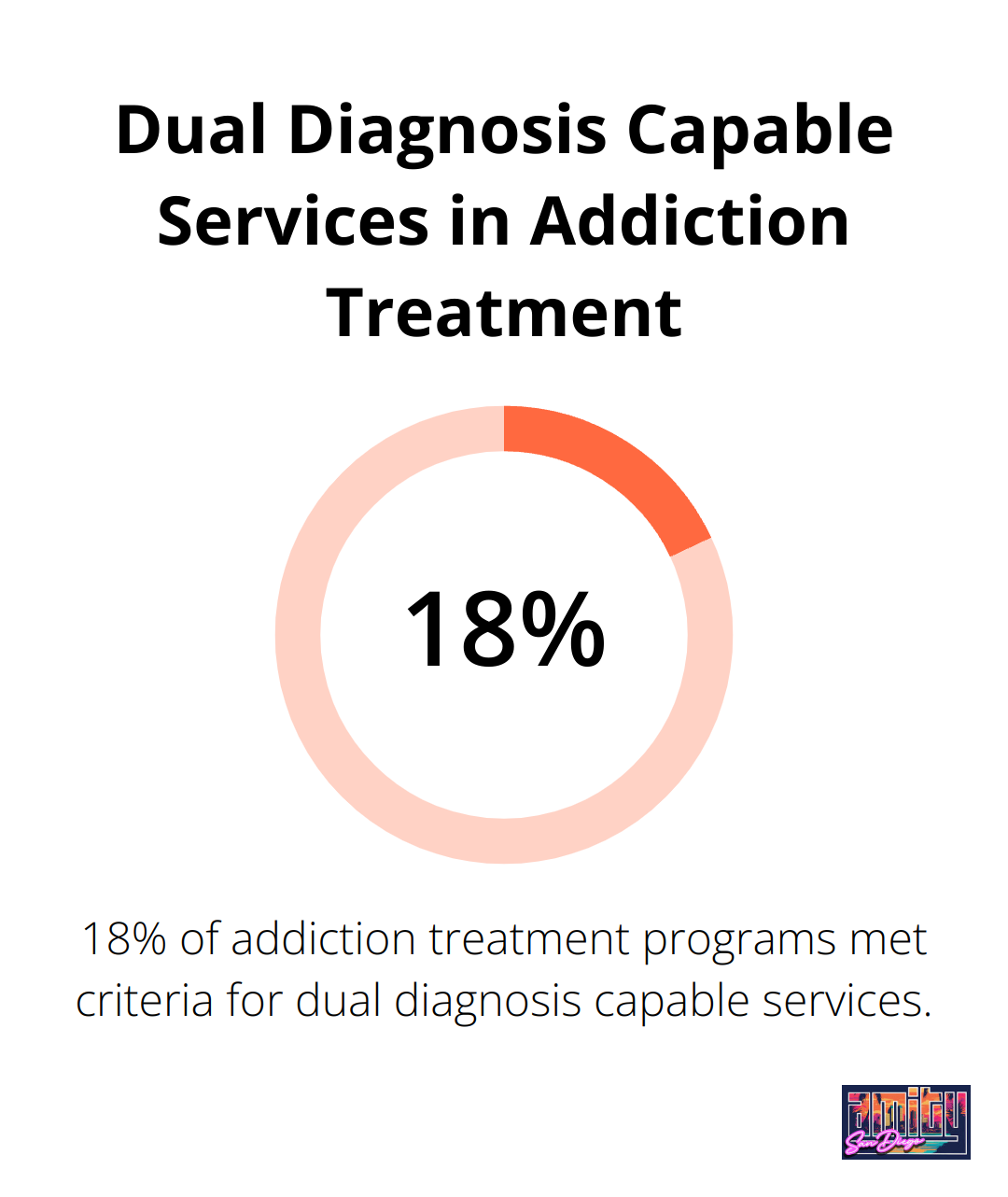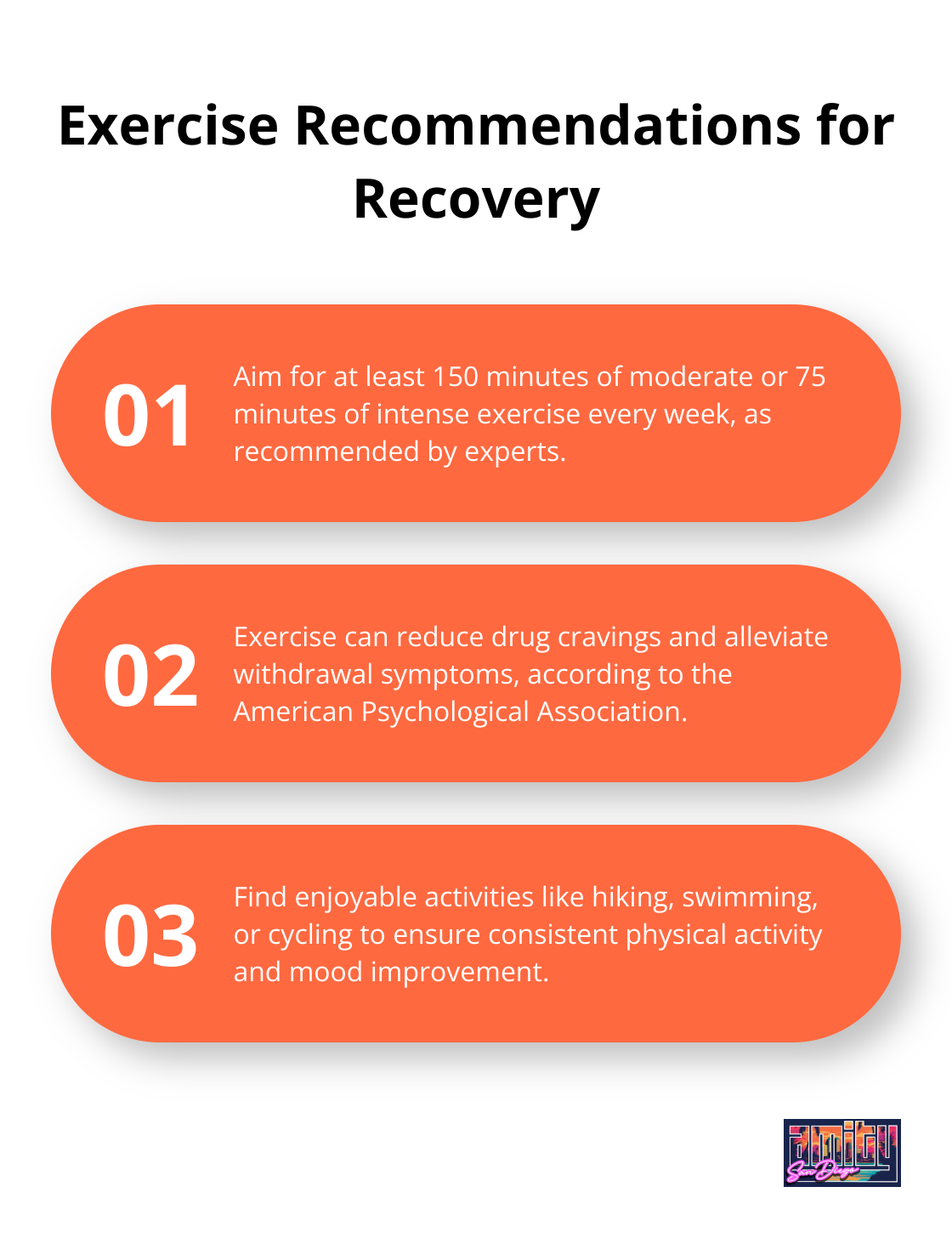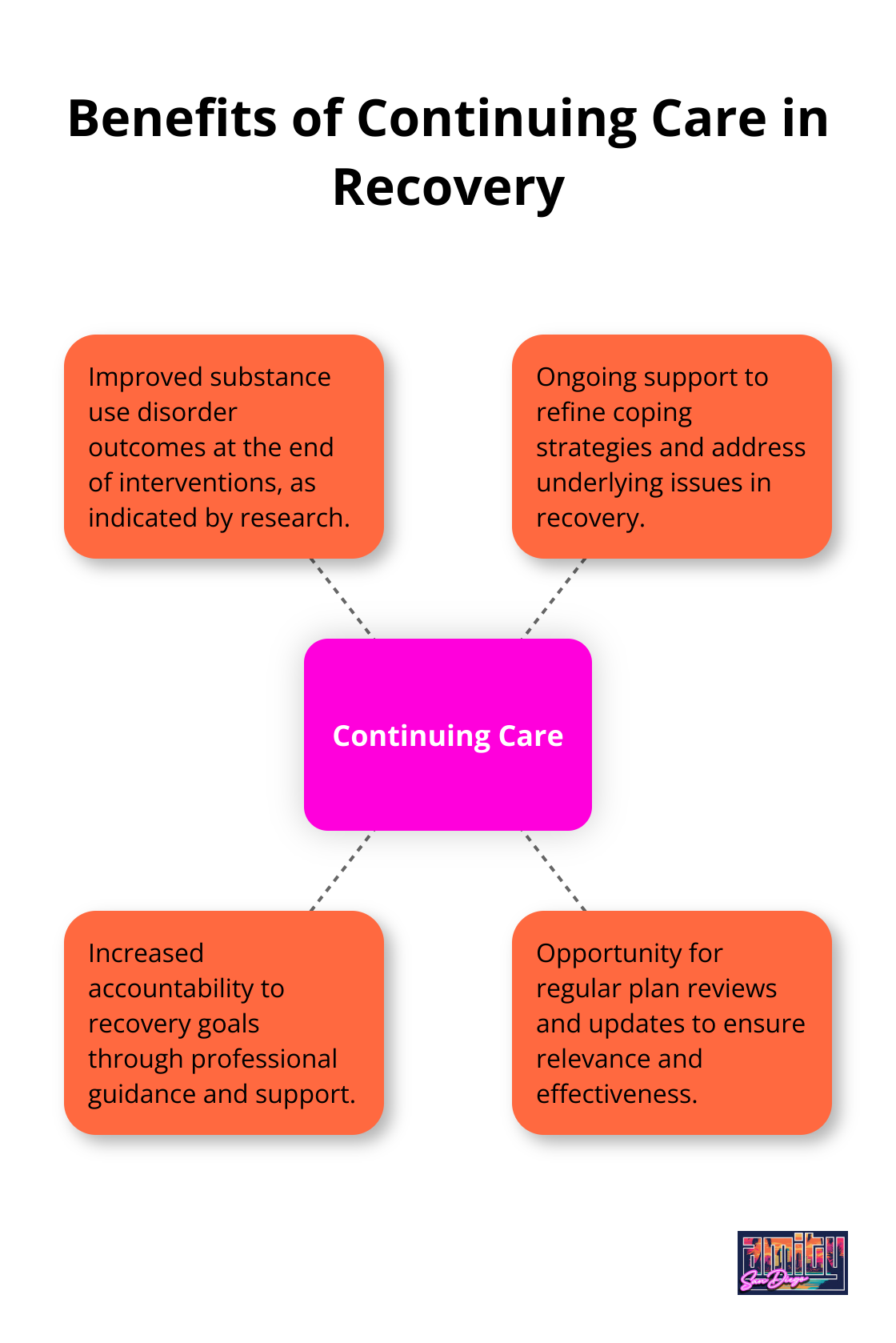At Amity San Diego, we understand that achieving long-term recovery is a journey that requires dedication, support, and effective strategies.
Our comprehensive guide explores key approaches to sustaining freedom from addiction, focusing on building a strong foundation, maintaining sobriety in daily life, and navigating challenges.
We’ll share practical tips and insights to help you or your loved ones on the path to lasting recovery.
Building a Strong Recovery Foundation
At Amity San Diego, we understand that a solid foundation is essential for long-term recovery success. Our approach focuses on four critical elements: personalized treatment, healthy coping skills, a robust support network, and addressing co-occurring mental health issues.
Customizing Your Treatment Plan
One-size-fits-all approaches don’t work in addiction recovery. We collaborate with you to create a treatment plan that addresses your unique needs, challenges, and goals. This plan may include a combination of evidence-based therapies, and holistic approaches when appropriate.
A personalized treatment plan offers numerous benefits that can greatly increase the chances of successful recovery. We regularly reassess and adjust your plan to ensure it evolves with your progress.
Cultivating Resilient Coping Mechanisms
Learning healthy ways to manage stress, triggers, and cravings is vital for sustained recovery. We teach practical skills like mindfulness meditation, deep breathing exercises, and cognitive restructuring techniques.
Our clients often find journaling, art therapy, or physical exercise helpful in managing emotions and reducing relapse risk. We’ll help you identify coping strategies that align with your personality and lifestyle.
Strengthening Your Support Network
A strong support system can significantly impact your recovery journey. We help you identify and nurture positive relationships while setting boundaries with those who might hinder your progress.
This includes connecting you with local support groups, alumni programs, and sober living communities.
Tackling Co-occurring Mental Health Conditions
Many individuals struggling with addiction also face mental health challenges. Our dual diagnosis approach ensures we treat both issues simultaneously, increasing your chances of lasting recovery.
We use evidence-based therapies like Cognitive Behavioral Therapy (CBT) and Dialectical Behavior Therapy (DBT) to address conditions such as depression, anxiety, and PTSD. Approximately 18% of addiction treatment programs met criteria for dual diagnosis capable services.

These four pillars form the cornerstone of our approach to building a solid foundation for your recovery journey. As we move forward, we’ll explore how to maintain sobriety in your daily life, an equally important aspect of long-term recovery success.
Daily Habits for Lasting Sobriety
Create a Structured Daily Routine
A consistent sleep schedule forms the foundation of a healthy routine. Adults should sleep 7-9 hours per night (as recommended by the National Sleep Foundation). Wake up at the same time daily, including weekends, to regulate your body’s natural rhythms.
Plan and eat meals at regular times. A balanced diet supports physical and mental health, which recovery requires. Consider meal prepping to ensure healthy options are always available.
Schedule time for work, recovery activities, and self-care. Use a planner or smartphone app to track appointments, meetings, and personal goals. This structure provides purpose and prevents idle time that could lead to relapse.
Practice Mindfulness and Stress Management
Mindfulness meditation shows promising results in addiction recovery. A study found that mindfulness-based relapse prevention and relapse prevention reported significantly lower risk of relapse to substance use and heavy drinking compared to treatment as usual.
Start with 5 minutes of daily meditation and gradually increase the duration. Use apps (like Headspace or Calm) for guided sessions. Practice deep breathing exercises throughout the day, especially during stressful moments.
Prioritize Physical Activity
Exercise is a powerful recovery tool. The American Psychological Association reports that it can reduce drug cravings and alleviate withdrawal symptoms. Try to complete at least 150 minutes of moderate or 75 minutes of intense exercise every week, as recommended.
Find activities you enjoy, such as hiking, swimming, cycling, or joining a sports team. The endorphin release from exercise combats cravings and improves mood.

Pursue Meaningful Hobbies and Interests
Hobbies provide a sense of accomplishment and fill time that might otherwise involve thoughts of substance use. Learn a new skill (cooking, painting, or playing a musical instrument). Join clubs or groups related to your interests to build a sober social network.
Volunteering offers purpose and gives back to the community. Many individuals find that helping others strengthens their own recovery.
Utilize Local Recovery Resources
Take advantage of recovery resources in San Diego. Attend support group meetings regularly (12-step programs like Alcoholics Anonymous or alternatives like SMART Recovery). Many find that a combination of professional treatment and peer support yields the best results.
Consider ongoing therapy or counseling to address underlying issues and maintain progress. Outpatient services can integrate into your daily life, providing continued support as you navigate sobriety.
The journey to long-term recovery requires vigilance and preparation. The next chapter will explore strategies to navigate challenges and prevent relapse, ensuring you stay on the path to lasting sobriety.
Overcoming Obstacles in Recovery
At Amity San Diego, we understand that the path to long-term sobriety presents challenges. Treatment enables people to counteract addiction’s disruptive effects on their brain and behavior and regain control of their lives. With the right strategies, you can navigate these obstacles successfully.
Identify and Manage Triggers
Recognizing your personal triggers is essential for maintaining sobriety. Common triggers include stress, specific people or places, negative emotions, and even positive events. We recommend keeping a journal to track situations that spark cravings or negative thoughts.
After you identify your triggers, develop specific action plans for each. For example, if stress triggers you, practice deep breathing exercises or call a supportive friend. If certain locations trigger cravings, plan alternative routes to avoid them.
Create a Robust Relapse Prevention Plan
A well-crafted relapse prevention plan serves as your roadmap to sustained recovery. A relapse prevention plan involves identifying triggers (feelings, thoughts, behaviors), coping strategies, and people to call when tempted to use, to halt the relapse process. Start by listing your motivations for staying sober. Include emergency contacts, coping strategies, and a step-by-step guide for what to do if you feel at risk of relapse.
Review and update your plan regularly. As you progress in recovery, your needs and challenges may change. Adapt your plan to ensure it remains relevant and effective.
Seek Professional Support
Don’t hesitate to seek professional help when facing challenges. A study indicated a small but significant benefit for continuing care on substance use disorder outcomes at the end of the interventions.

Flexible outpatient programs can provide continued support as you navigate life in recovery. A professional team can help you refine coping strategies, address underlying issues, and stay accountable to your recovery goals.
Embrace Growth and Self-Improvement
Recovery offers an opportunity for personal growth beyond abstaining from substances. Set goals for yourself beyond sobriety. This might include advancing your career, improving relationships, or pursuing education.
Try learning new skills or hobbies. Engaging in meaningful activities can be beneficial for individuals in recovery.
Setbacks don’t equal failure. If you slip, reach out for help immediately. The faster you address a lapse, the more likely you are to get back on track quickly.
Individual therapy can empower you with the tools and insights needed to overcome obstacles and achieve your full potential in recovery.
Final Thoughts
Long-term recovery transforms lives through dedication and a comprehensive approach. We at Amity San Diego witness how personalized treatment, healthy coping skills, and strong support networks build the foundation for lasting sobriety. Daily habits like structured routines, mindfulness, and physical activity support recovery and contribute to overall well-being.
Individuals can overcome obstacles and maintain sobriety by identifying triggers and developing robust relapse prevention plans. Professional support plays a vital role in refining coping strategies and addressing underlying issues. Self-improvement through new skills or hobbies benefits many in recovery (e.g., advancing careers or pursuing education).
The journey to long-term recovery requires persistence and self-compassion. You have the strength to reclaim your future and live free from addiction. We encourage you to stay committed to your goals and continue growing. For personalized support on your recovery journey in San Diego, contact our team today.



